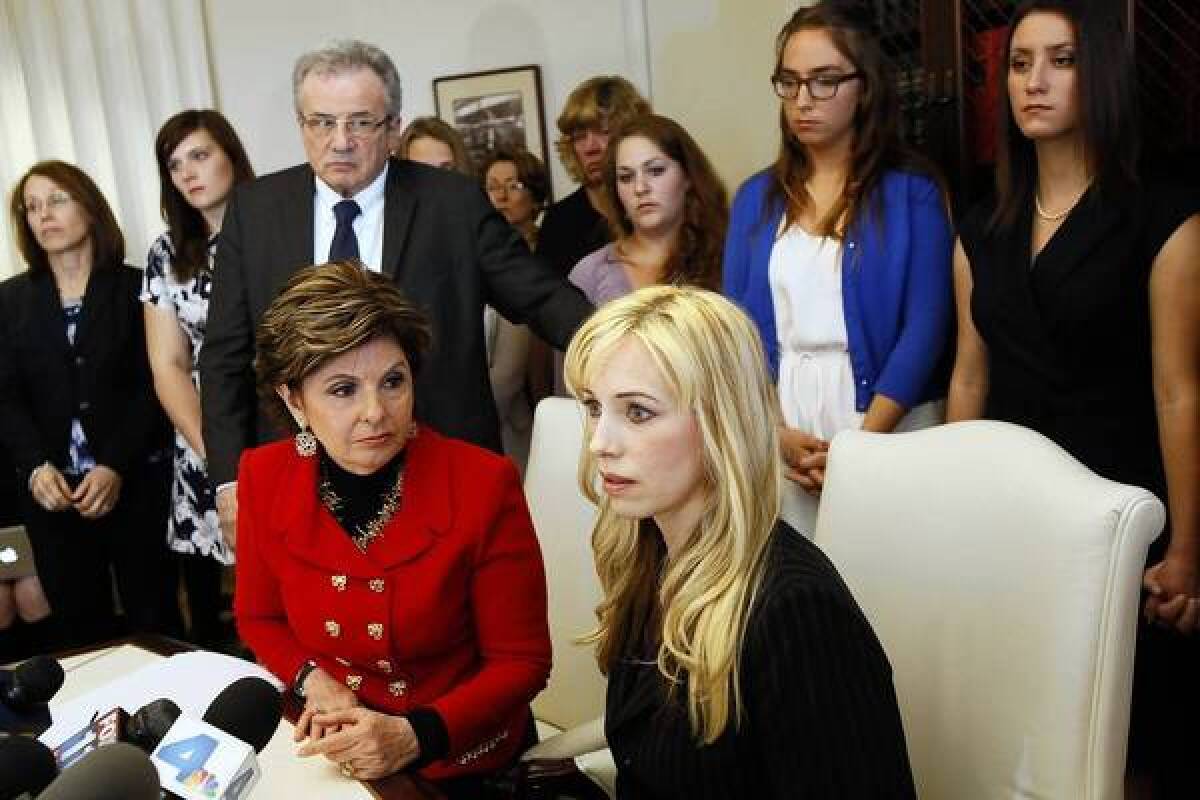USC, Occidental underreported sexual assaults

Amid federal investigations of their handling of campus sexual assaults, USC and Occidental College have disclosed that they underreported the number of cases in recent years, a potential violation of federal law.
At USC, officials indicated that they had not reported 13 accounts of sexual assaults to federal officials for 2010 and 2011, bringing the total for those years to 39. Occidental acknowledged that it had failed to include 24 reports during that period, bringing the total to 36.
The disclosures could lead to hundreds of thousands of dollars in penalties for each school under the federal Clery Act, the 1990 law that requires schools to report campus crime statistics to the Department of Education.
The law, which stemmed from a 1986 rape and killing on a Pennsylvania campus, is intended to give the public an accurate view of campus safety, and the statistics are consulted by parents, students and others evaluating the campuses. The law covers criminal allegations, regardless of whether they are reported to police or adjudicated in court.
Over the last two years, women at USC, Occidental and college campuses across the country have organized — mostly through social media — to file complaints with the Department of Education alleging that administrators discouraged them from reporting sexual assaults or downplayed the severity of the attacks.
Occidental is now under investigation for violations of the Clery Act. Students at USC have filed a complaint alleging Clery violations that federal investigators have yet to act on. In addition, both schools are under investigation for possible violations of Title IX, a federal antidiscrimination law that requires colleges to impartially investigate sexual assaults.
“If they’re fixing them while the complaint is being investigated, it’s too late,” said Alison Kiss, executive director of the nonprofit Clery Center for Security on Campus, which trains schools on complying with the law.
Federal officials could not be reached for comment because of the partial government shutdown. In the past, they have imposed hundreds of thousands of dollars in fines against individual campuses for violations of the Clery Act. Each violation can draw a penalty of up to $35,000.
USC and Occidental attributed their restated numbers to the mishandling of cases involving those who reported incidents anonymously. Such cases are subject to federal reporting requirements.
Occidental officials say they discovered 49 anonymous reports of sexual assaults spanning several years in a 2010 survey conducted by Project SAFE, a campus group that seeks to raise awareness about sexual assaults. Nineteen of those incidents should have been disclosed under federal rules, which require the reporting of all sexual assaults on campus or in the immediate vicinity.
“It was a mistake,” Occidental spokesman Jim Tranquada said.
The remaining 30 reports of sexual assaults won’t be forwarded to federal officials because they occurred off campus or contained incomplete information about where and when they occurred, Tranquada said.
Occidental also had six reports of sexual assaults that should not have been included under federal rules because they occurred off campus, Tranquada said.
At USC, the problem arose because the administration has since 2008 told students, parents and the federal government that crimes that came to light at its student counseling center would be included in official crime statistics. But they were not, the university acknowledged last week.
Campus administrators said they didn’t disclose those numbers in an effort to protect the students’ confidentiality. They were concerned, they said, that reporting those statistics to the Department of Education could trigger investigations by the Los Angeles Police Department, which might pressure counselors to identify the anonymous victims.
“The intent was to give … safe haven to the students,” said Laura LaCorte, a university compliance officer. “That’s the reason they weren’t included.”
LAPD Deputy Chief Bob Green said those concerns were misplaced.
“I can tell you flat out no, we’re not going to do that,” Green said. “We’re never going to try to compel anybody to make that [crime] report.”
At both schools, some students and professors are concerned that numbers will continue to be underreported. Indeed, they say, new policies adopted to address past errors will lead to excluding many accounts of sexual assaults from campus safety reports.
At Occidental, the college has now designated a smaller geographic area in which sexual assaults are reported. Tranquada said the school had been basing its reports on too large an area and the new change better complies with federal regulations.
Caroline Heldman, dean of the politics department and a faculty advocate for victims of sexual assault, saw another motive.
“The college is making a concerted effort to report lower numbers,” she said. “It makes them look better but will put students in more harm.”
At USC, the campus will no longer list the counseling center as a source of crime statistics. From now on, students who want their sexual assaults included in crime statistics will have to inform designated campus safety officials who are required to report under federal rules, LaCorte said.
Francesca Bessey, a USC junior who said she was sexually assaulted, said making students take additional steps to have their assaults counted shifts “responsibility away from the university and toward students who have been assaulted.”
More to Read
Sign up for Essential California
The most important California stories and recommendations in your inbox every morning.
You may occasionally receive promotional content from the Los Angeles Times.











